By Sami Zaptia.
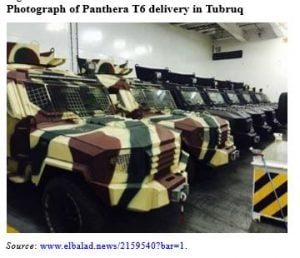
London, 12 June 2017:
A United Nations report concludes that arms have continued to be illicitly transferred to and from Libya on a regular basis. It states that materiel entering Libya has been of an increasingly sophisticated nature. External assistance to armed groups has also increased with fighting groups expanding their air forces, which have been used in attacks against other armed groups and each other.
The conclusions came in the UN Libyan Experts Panel final report presented to the Security Council released last week.
Assessing the UN-imposed arms embargo on Libya, the 299-page report says that ‘‘arms have continued to be illicitly transferred to and from Libya on a regular basis. While outflows have continued to be moderate, consisting mainly of small arms and light weapons, materiel entering Libya has been of an increasingly sophisticated nature. External assistance to armed groups in terms of direct support, training and technical assistance has also increased’’.
‘‘At least two of the armed groups operating in Libya have expanding air forces, which have been used in attacks against other armed groups and each other. The Panel has reviewed commercial satellite imagery of relevant Libyan airports and airfields in order to investigate the development of air capabilities’’.
‘‘The political process that the exceptions to the arms embargo were designed to support has not developed in the manner anticipated, as the relationship between armed groups and political entities remains transactional and transitional. The Government of National Accord has not provided information on the structures of security forces under its control, nor has there been any demonstration of such control’’.
‘‘Such issues highlight the need for the continuance of the arms embargo with a clear identification of those armed and security forces that can legitimately benefit from exceptions and exemption requests’’.
‘‘The Panel has continued to investigate deliveries of weapons and ammunition made during the revolution (of 2011). Insurgents on the western front depended on transfers from Benghazi over the sea route to Tunisia and onward to the Nafusa Mountains’’.
‘‘After a meeting between the late General Abd al-Fattah Younis and foreign representatives in mid-April 2011, it was decided to organize a major delivery to the western front. The Panel has collected over eight accounts of a delivery by sea, paid for by Qatar, of about 40 tons of military equipment to Zarzis, allegedly escorted by the Tunisian armed forces to the Dhehiba-Wazin border post with Libya’’.
‘‘The Panel found that one maritime delivery had been made to the port of Zarzis by the end of April 2011. Furthermore, in an interview with the television channel Al-Arabiya, the former Prime Minister of the transitional Government of Tunisia, Beji Caïd Essebsi, confirmed that Qatar had received permission to transfer military equipment to Libya through Tunisia using the Remada military airbase around 52 km from the Dhehiba-Wazin border post’’.
‘‘Between May and June 2011, the dirt airstrip south of Zintan was graded to allow military cargo planes such as the C-17 to land safely. Since then, most transfers to the western front have been conducted by air, bypassing Tunisia’’.
The UN report confirmed how an attempt to prosecute an arms exporting company to Libya was dropped by a US court. ‘‘The Panel previously reported on Marc Turi and the Turi Defense Group, concerning attempts to export weapons to Libya during 2011. A United States Department of Justice prosecution of Turi was due to have commenced on 8 November 2016 in Phoenix, Arizona. The case was dropped in October 2016, with prosecutors quoted as saying that “‘discovery rulings’ from [the] U.S. District Court Judge … contributed to the decision to drop the case”.
‘‘The Panel notes that the (court) document states, “While the parties disagree on the facts of this case and the defendants deny any criminal conduct, the defendants acknowledge that the charges obtained in this case were based in fact”, indicating the existence of networks whose purpose was the import of weapons into Libya.
‘‘Panel enquiries with the United States requesting further information on the case have not elicited any additional details, and attempts to contact Turi’s legal representatives have not received a response.
The UN report also documented an Italian arms network accused of smuggling arms to Libya. ‘‘Italian police arrested three Italian nationals in January 2017. They are accused of smuggling helicopters and weapons, including surface-to-air missiles, assault rifles and anti-tank missiles, to Libya (and the Islamic Republic of Iran) between 2011 and 2015. The case is still the subject of an ongoing legal process in Italy, and the Panel continues to investigate’’.
‘‘The Panel previously reported on arms transfers from Italy in 2011. Potentially related to the alleged transfer of arms from the island of Santo Stefano to Benghazi, the Panel confirmed with a former revolutionary that he had received an arms delivery from Italy “that had originated from the Balkans”.
On potential arms transfers into Libya after the end of the Libyan revolution which it takes to be September 2011, the UN Libya Experts Panel states that it had ‘‘previously expressed its concern about the impact of transfers of military equipment in the absence of transparent and traceable procurement practices. Several deals concluded with end-user certificates being signed by the then Deputy Minister of Defence, Khaled al-Sharif, including such that were notified to the Committee, have been discussed in a previous report’’.
‘‘At present, such materiel continues to be diverted. In this vein, the Panel is currently investigating the alleged purchase of military equipment by two private Libyan companies for the Benghazi Joint Security Room, which was created in 2013, bringing together the special forces of Benghazi, Libya Shield and several extremist armed groups’’.
‘‘The deal was brokered by a Jordanian company, and the transport was facilitated through a Libyan subsidiary of a company registered in the United States. No exemption notification was made to the Committee for the military equipment that had been ordered. The Panel continues its investigation’’.
On transfers or potential transfers of materiel, provision of training and technical assistance to Libya since the strengthening of the arms embargo in August 2014, the report says that ‘‘Arms and ammunition continue to be transferred to various parties in Libya with the involvement of Member States and brokers. There has also been an increase in direct support from Member States and foreign armed actors, including in the establishment of military facilities’’.
On the increasing development of LNA air force, the UN Libya Experts Panel report stated that it had ‘‘received information that attack helicopters had been delivered to the LNA in April 2015. It also received related pictures showing an Mi-24p (helicopter) (with tail No. 785 and serial No. 21785) on a military base in eastern Libya’’.
‘‘The Panel traced the origin of the helicopter to Belarus. Belarus has confirmed to the Panel that an Mi-24p helicopter with such markings had been transferred to the United Arab Emirates in 2014 as part of a delivery of four Mi-24p. Belarus had issued an enduser certificate and registered the transfer in the United Nations Register of Conventional Arms of 2015”.
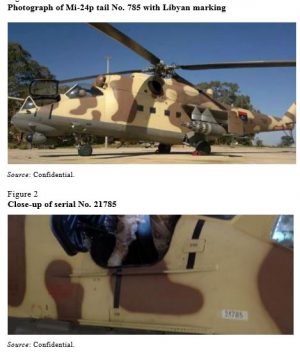
‘‘The Committee did not receive an exemption request for the transfer of this helicopter, nor has Belarus received any request by the United Arab Emirates for authorization of re-export of helicopters. The Panel has sent a letter to the United Arab Emirates asking for detailed information on the transfer of the attack helicopter to Libya but has not received a response’’.
‘‘The Panel has received photographic evidence of an AT-802i fixed-wing aircraft based in LNA in eastern Libya. Iomax USA Inc. has developed and modified a commercial agricultural/fire aircraft for counter-insurgency and border protection, purposed and currently marketed under the brand “Archangel”. The Panel could confirm that until February 2017 the only client of Iomax was the United Arab Emirates, for which it had produced and sold 48 units’’.
‘‘The first generation of Archangels was based on the AT-802i, a single-engine aircraft built by the United States company Air Tractor. The plane shown in the photograph below was part of a delivery to the United Arab Emirates in March 2011”.
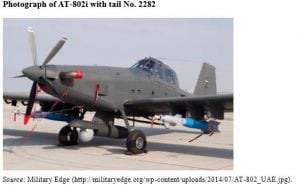
‘‘The first AT-802i sighted in Libya, with tail No. 2287, was part of the same delivery to the United Arab Emirates in March 2011. The aircraft in Libya shows six underwing hardpoints and a forward-looking infrared systems designator turret mounted on an Iomax flexible pod system’’.
‘‘The Panel is concerned about retransfers used to conceal LNA as the real end user. The Panel is investigating an ongoing case involving Mi-24v attack helicopters that have been offered to the air force of Haftar’s LNA without the submission of an exemption request to the Committee’’.
On international support for the LNA, the UN report says that ‘‘the United Arab Emirates have been providing both material support and direct support to LNA, which have significantly increased the air support available to LNA. The Panel has received no response from the United Arab Emirates to its enquiries’’.
On French involvement in Libya, the UN report says ‘‘the presence of French military personnel in Libya was publicly acknowledged by the Ministry of Defence of France, following the deaths of three operatives in an LNA helicopter crash near the city of Benghazi. The three soldiers were reported to have been on an intelligence-gathering mission in the east of Libya. France has stated to the Panel that its military activities in Libya conform to international law’’.
The UN panel believes that other states are also involved in supporting the fighting factions in Libya. ‘‘The recent air strikes against targets in the oil crescent to support the recapture by LNA of a number of oil terminals demonstrated a capability for night bombing missions that are believed to be outside the capabilities of the integral air force of LNA. Confidential sources suggest that a regional State was responsible. The Panel’s investigations are ongoing’’.
The UN Libya Experts Panel also reported on the development of Misrata’s air force and its investigations relating to aviation capability and mercenaries. ‘‘Aerial attacks from the Misrata airbase have continued since 2016. Two Mirage F1 fighter jets were operational and were flown by at least three foreign pilots acting as mercenaries. They reportedly flew from March until the third week of July 2016. One of them died after his plane crashed on 2 June 2016, having carried out a raid against ISIL in Sirte’’.
‘‘Since the crash, only one Mirage F1 in Misrata has remained operational. While the Panel was able to identify the deceased pilot as a national of Portugal and a permanent resident of Germany, the latter State has not provided information that could have helped to disclose relevant leads on the entities that had contracted him and had paid for his services in Libya’’.
‘‘A team of engineers from Ecuador has been in charge of the maintenance of the Mirage F1. When contacted by the Panel, Ecuador stated that it had no knowledge of such activities. While a bank account related to the payment of the engineers has been identified, Ecuador has not responded to a Panel request for further details’’.
‘‘The company that recruited the engineers is “Gateway to MENA for Logistics Services”, registered in Jordan. The representative of the company in the contract is a Moldovan citizen, Sergiu Banari. The Republic of Moldova confirmed that Banari had a connection with the arms broker Rami Ghanem, who holds both United States and Jordanian citizenship. Ghanem had also been involved in the recruitment of the Ecuadorian crews’’.
‘‘Ghanem was arrested in Greece on 8 December 2015, after he allegedly tried to ship weapons illegally to Hizbullah. The company has admitted to having “provided some services to the Government of National Accord” and has mentioned that it had an altercation with “a former employee” who was mentioned in the Panel’s final report for 2016 and identified as one of the pilots flying the Mirage F1 from Misrata.
‘‘Regular money transfers from the Latvijas Pasta Bank (Latvia) were carried out by (two) companies (Deal Logic Dox LP and Irework Trading LP both registered at the same address in Edinburgh Scotland) registered in the United Kingdom of Great Britain and Northern Ireland to the benefit of several Ecuadorian citizens who had been members of the Ecuadorian Air Force’’.
‘‘Regular payments to these individuals were detected between June and December 2015. Engineers received almost $10,000 per month, while pilots received $20,000. The Panel requested further bank details from Ecuador and the United Kingdom but has not received the requested information’’.
‘‘The Panel has learned that after the arrest of Ghanem, individuals from Misratah have contracted the Ecuadorian team directly. Some individuals involved have been identified. Several sources have confirmed that Abdul Salam Fakroum, a well-known Misratan businessman, has also been involved on the logistical side of hosting some crew members outside the airbase in the city of Misratah. He has also been providing the pilots of the Mirage F1 with the coordinates of the targets to be attacked, at least until the operations against ISIL in Sirte started’’.
On the presence of international Special Forces in Libya, the report stated that ‘‘the Panel has received consistent reports of Italian, United Kingdom and United States special forces personnel operating in support of the operations of Operation Bunyan Marsus, providing both technical assistance and direct support. None of the countries involved have commented on Panel inquiries into the presence of their special forces within Libya’’.
The report says that while UN resolutions provide an exception to the arms embargo for “supplies of non-lethal military equipment and assistance to the Libyan Government”, ‘tThe resolutions provide no other mechanism for identifying national security forces under the control of the Government of National Accord. Given the issues concerning the political process and the transactional and transitional nature of the allegiances of armed groups, including those currently providing support to the Presidency Council, the Panel does not view any grouping as benefiting from this exception at this time’’.
‘‘In view of this, the Panel believes that any supplies of non-lethal military equipment, technical assistance, training or financial assistance to an armed group, without the approval of the Committee, contravenes the arms embargo’’.
On training activities provided by outside states, the report states that ‘‘EUNAVFOR MED delivered an initial training package, beginning in October 2016, reportedly for 78 Libyans on board two EUNAVFOR MED vessels. The initial training package was stated to have included basic seamanship and more advanced specialist skills. It was stated in the same document that training was being delivered to both the Libyan coastguard and the Libyan navy. A subsequent statement indicated that 89 individuals had received training in the first training package’’.
‘‘A second package of training was started on 30 January 2017 for 20 Libyan coastguard and navy trainees. The statement released by the European Union providing these details again stated that only 78 individuals had been trained in the first package. It also states that the original memorandum of understanding had been signed with the “Libyan navy coastguard” rather than with the navy and the coastguard as separate entities, as the European Union refers to them elsewhere in the same statement and in its other public announcements’’.
‘‘In the eighteenth preambular paragraph of resolution 2312 (2016), the Council took note of the decision of the Council of the European Union to expand the EUNAVFOR MED mandate to the training of the Libyan coastguard and navy in law enforcement at sea. However, the anticipated briefing by EUNAVFOR MED to the Committee regarding their activities had not taken place’’.
‘‘Neither the coastguard nor the navy has been notified to the Committee as part of the security forces under the control of the Government of National Accord, and the issue of control is further highlighted by multiple reports of criminal activities involving the coastguard, most notably by UNSMIL: “Migrants, as well as representatives of international non-governmental organizations that carry out search and rescue operations, have also recounted dangerous, life-threatening interceptions by armed men believed to be from the Libyan coastguard. After interception, migrants are often beaten, robbed and taken to detention centres or private houses and farms, where they are subjected to forced labour, rape and other sexual violence”.
‘‘These reports highlight further concerns raised with the Panel over the level of vetting to which trainees have been subject’’.
With regards to training provided by France to the Presidential Guard, the report states that ‘‘close protection training has been delivered by France to a unit of the Presidential Guard in Tripoli. The Panel understands that the training is being delivered in batches, with a total of approximately 80 personnel to be trained by mid-2017’’.
‘‘The European Union and France have indicated to the Panel that the training was undertaken upon the request of the Presidency Council and Al-Serraj, respectively. Both used paragraph 10 of resolution 2095 (2013) as the authority for their training, without reference to the later resolutions. In the Panel’s opinion, it remains unclear as to who can benefit from the exception, with diverging interpretations of the resolutions’’.
On the deployment of Italian military personnel, the report states that ‘‘the deployment of an Italian military hospital to Misrata airport came with a simultaneous reported deployment of at least 100-armed military personnel. The presence of armed military personnel as a protective measure for the hospital was confirmed in official communications with the Panel. No exemption request or notification was submitted to the Committee’’.
‘‘In response to Panel enquiries, the Russian Federation indicated that Krasnopol guided artillery projectiles were designed by AO Shipunov KBP Instrument Design Bureau in Tula and manufactured by AO Kalashnikov Concern in Izhevsk’’.
‘‘However, in 2014 AO Kalashnikov Concern did not manufacture Krasnopol projectiles or export them to foreign customers. The Russian Federation also indicated that the explosive fill shown was not the one used in that type of projectile and that AO Kalashnikov Concern as the manufacturer did not use markings like the lot number shown’’.
‘‘The Panel has also investigated the potential for the projectile to be a GP-1 or a GP-6, manufactured by China North Industries Corporation, which have the same external features as the Krasnopol; however, no response has been received from China. Investigations continue’’.
With regards to deliveries of armoured personnel carriers and other vehicles, the report states that ‘‘the Panel has confirmed new reports of deliveries of armoured vehicles to the LNA in Tobruq on 17 April 2016. According to the bill of lading, the delivery consisted of 93 armoured personnel carriers and 549 armoured and non-armoured vehicles’’.
‘‘The 93 carriers likely included 75 Panther T6, produced by Minerva Special Purpose Vehicles, and 18 Tygra models, produced by Mezcal (a spin-off from the former), both based in the United Arab Emirates. The armoured personnel carriers were part of the same contracts on which the Panel reported previously and that were brokered by the United Arab Emirates-based company Ard el Theqa General Trading and designating the Ministry of the Interior of Libya as the end user. A representative of Mezcal confirmed to the Panel in 2015 that it had previously shipped 10 Tygras to Tobruq”.
‘‘The Panel’s investigations indicated that the vessel Bahri Abha (IMO 9620944) had shipped the vehicles from the United Arab Emirates. The Bahri Abha is registered in Saudi Arabia and belongs to a Saudi State-owned shipping line. The Panel contacted the Saudi authorities, which confirmed the shipment and shared the bills of lading. The ship left Jebel Ali port (United Arab Emirates) on 24 March 2016 and docked in Tobruq on 17 April 2016’’.
‘‘Of the 549 vehicles, 195 Toyota Land Cruiser pickup trucks were loaded in Jeddah Islamic Port, Saudi Arabia. The pictures below show the delivery of the armoured personnel carriers, as well as workshops where weapons are fitted to the vehicles.
‘‘For armed groups in Libya, Toyota pickup trucks (primarily single-cabin HZJ 79) seem to be even more important than armoured vehicles, because of the ease in mounting various infantry support weapons, notably 12.7-mm and 14.5-mm machine guns and 106-mm recoilless rifles. The Panel’s assessment is that when such vehicles have armed and security units as end users, they should be viewed as military materiel’’.
‘‘Furthermore, the Panel has received Member State reports indicating that Libyan armed groups also use pickup trucks as barter items in exchange for weapons and ammunition and as payment to mercenaries. During the reporting period, the Panel received information on large deliveries of Toyota pickup trucks and armoured 4×4 cars to Tobruq on 16 January and 4 April 2017’’.
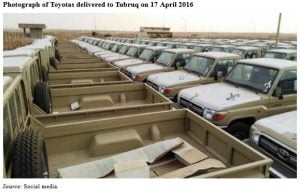
‘‘The Panel received confirmation of reports that deliveries of interception and jamming equipment had been made to Tripoli since the adoption of resolution 2174 (2014) in August 2014. The Panel obtained a letter of complaint from the Libyan Post, Telecommunication and Information Technology Company to one of the suppliers of the materiel. The Panel also interviewed a Libyan buyer who travelled to Marbella, Spain, on multiple occasions to procure such equipment’’.
‘‘This equipment was deployed in several areas of Tripoli, under the control of different armed groups, including the National Mobile Force, the Special Deterrence Force, the National Guard and the Abu Salim Brigade’’.
‘‘These groups have been involved in serious human rights violations and criminal activities. The capability to listen into mobile phone conversations and read private messages increases their operational effectiveness and provides a significant tactical advantage over rival armed groups’’.
‘‘More importantly, in a city where bank robberies, abductions and killings frequently occur, the ease of access to materiel capable of tracking the movements of civilians is a significant threat to peace and security. The Panel has received information that such equipment has been used for blackmailing and to plan kidnappings’’.
On private security companies operating in Libya, the report stated that ‘‘the Panel is currently looking into reports on the presence of private security companies in Libya, notably the precise details of the contracting of the Russian company RSB Group for the demining of the facilities of the Libyan Cement Company in Benghazi’’.
On the flow of weapons from Libya o neighbouring states, the UN report stated that ‘‘on 7 March 2016, ISIL elements launched a major attack on police and national guard stations, as well as a military camp, in the southern Tunisian town of Ben Gardane, located 20 km from the Libyan border’’.
‘‘The Tunisian security forces seized a considerable number of weapons and, as a result of the ensuing investigations, located over six arms caches in the wider region of Ben Gardane near the Libyan border. The Security Council condemned “in the strongest terms the 7 March terrorist attack …, which resulted in the deaths of 12 members of Tunisia’s security forces and 7 civilians, as well as over 17 injured”.
‘‘In April 2017, the Tunisian authorities closed the investigations and indicted 77 people. The Tunisian Armed Forces have granted the Panel access to materiel seized by the security forces in March and April 2016 in the wider Ben Gardane area, following the attack’’.
‘‘With the support of the Tunisian authorities, the Panel identified a series of over-under shotguns produced by Torun Silah Sanayi and seized in March 2016 from an arms cache discovered after the attack in Ben Gardane and smuggled into the country from Libya’’.
‘‘Following the Panel’s enquiry with Turkish authorities, Torun Silah Sanayi claims to have sold the shotguns to the “Yassine Middle East Company”, a shotgun reseller in Beirut. According to the Turkish authorities, the customs declaration states that these shotguns were loaded onto the vessel Haddad I, which was intercepted by the Hellenic coastguard in September 2015. The materiel on board the Haddad I was seized by Greece’’.
‘‘However, the serial numbers documented by the Panel in Tunisia do not seem to match the packing lists provided by Torun Silah Sanayi through the Turkish authorities. The Panel also found inconsistencies between the preliminary investigations of the Greek police and the documentation previously provided by the Turkish authorities. It seems unlikely that the shotguns were transferred to Libya after they had been seized by Greece on board the Haddad I. The Panel has requested clarifications from both the Turkish and the Greek authorities’’.
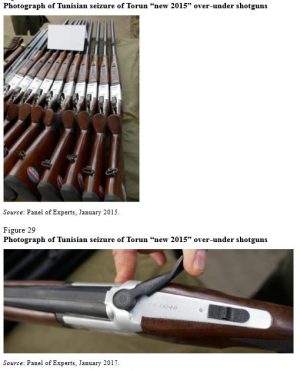
‘‘Another item of interest recovered was a Night Owl model NONB2FF night vision device, serial No. 50003063, which is marked as having been manufactured in Belarus. Research by the Panel indicates that Night Owl Optics operates from a company address in Texas, United States. The United States has not responded to the Panel’s request for information’’.
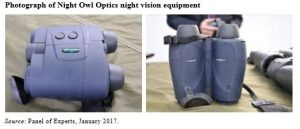
‘‘Egyptian authorities provided a list of weapons, sorted by type and quantity, that were seized in the course of being smuggled from Libya to Egypt between 1 January and 11 November 2016. The most significant number of weapons recovered was 1,395 shotguns. No further details were provided, and the Panel continues to engage with the Egyptian authorities in order to gain further details so as to establish the original supplier of these weapons’’.
‘‘Officials of the Niger reported a reduction in the scale of weapons trafficking from Libya in 2017; however, they raised issues such as migrants being used as “mules” to transport weapons and the Tebu community providing links between ISIL in Libya and Boko Haram’’.
‘‘From within the Tuareg community, the Panel received repeated reports regarding arms transfers from Ansar el Haqq, headed by Mohammed Ingtallah and based in Awbari, to Ansar Eddine in Mali. The deliveries are allegedly composed of light weapons, such as Zastava M80 assault rifles, anti-tank weapons and explosives. The operations are supposedly coordinated by Ingtallah’s son’’.
‘‘The Panel reviewed reports of seizures by Algerian authorities but could not physically inspect the materiel’’.








